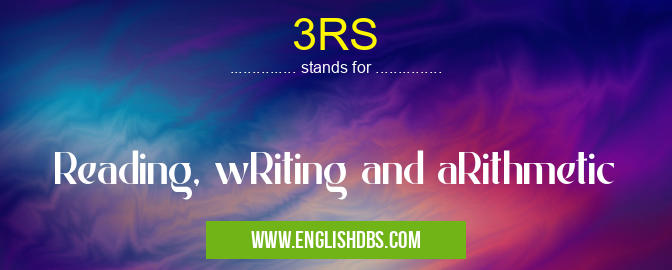What does 3RS mean in EDUCATIONAL
3RS stands for Reading, wRiting and aRithmetic. It is an educational acronym for the three basic skills required to successfully learn and understand more complex subjects in school or college. These are foundational skills that are essential for a well-rounded education and building a strong knowledge base. The 3Rs are still taught in most schools throughout the world today, although there is increasing focus on expanding students' learning beyond these traditional core subjects.

3RS meaning in Educational in Community
3RS mostly used in an acronym Educational in Category Community that means Reading, wRiting and aRithmetic
Shorthand: 3RS,
Full Form: Reading, wRiting and aRithmetic
For more information of "Reading, wRiting and aRithmetic", see the section below.
» Community » Educational
What Does 3RS Stand For?
The 3Rs of education, “Reading, wRiting and aRithmetic” represent the essential building blocks of any curriculum from kindergarten through to university level. These three core skills form the foundation for more advanced study in language arts, mathematics, science, social studies and other academic disciplines. By mastering these basic concepts in an early stage of development, students can form strong mental scaffolding upon which to build all their future learning successes.
How Do The 3Rs Help In Community?
The 3Rs play an important role in many communities by providing children with the opportunity to develop knowledge and skills which can be applied later on in life; such as careers that require strong written communication or problem-solving ability. Without such fundamental information it would be difficult to make informed decisions when presented with various challenges encountered in real-world scenarios. Furthermore, mastery of these three core skills can lead to increased confidence and self-esteem amongst individuals who may have otherwise felt underprepared or lacking in knowledge.
Essential Questions and Answers on Reading, wRiting and aRithmetic in "COMMUNITY»EDUCATIONAL"
What is the purpose of teaching Reading, Writing and Arithmetic?
The three Rs of education – Reading, Writing and Arithmetic – are essential for young learners to develop basic literacy skills. Reading and writing provide the foundation for communication, while arithmetic helps students understand math concepts and principles. Learning these core skills is critical for success in school, work and life.
How does learning the 3Rs help build a strong foundation?
Learning the 3Rs helps build a strong foundation by providing children with a solid base of knowledge that they can use throughout their academic life. Reading helps sharpen comprehension, writing enhances expression and clarity of thought, while arithmetic helps develop problem-solving skills. All three have essential real-world applications that benefit students long after their formal schooling has ended.
What are important components of reading, writing and arithmetic instruction?
When teaching reading, writing and arithmetic it is important to focus on both accuracy and fluency. For reading instruction, teachers should emphasize key reading strategies such as phonemic awareness (sound recognition) and sight word recognition to improve decoding abilities. Writing should be taught using handwriting techniques as well as grammar lessons to help students express themselves clearly through written language. Arithmetic should include memorization of numerical facts and practice with basic operations such as addition, subtraction, multiplication and division.
What is the best way to introduce the Three Rs to kids?
The best way to introduce kids to the Three Rs is through engaging activities that foster exploration and curiosity. These activities could include games that focus on letter recognition or counting numbers; reading stories aloud; pretending to write or draw letters; solving puzzles or completing simple math problems; or playing pretend shop with money counting games. Through these fun activities, children can become familiar with the fundamental concepts behind each R in a fun and engaging way!
When should children start learning about Reading, Writing and Arithmetic?
Children can begin learning about the three Rs as early as preschool age when they become curious about topics such as letter names/sounds or simple math equations. As they grow older (i.e., grade school/middle school), more complex forms of each R can be explored in order to further enhance their understanding of these essential academic areas (e.g., studying different types of text structures in literature class).
What tips can parents give their child when it comes to learning about Reading, Writing & Arithmetic?
Parents can encourage their child's interest in learning about the three Rs by providing them with a supportive environment at home where they feel comfortable practicing their newly acquired skills (such as writing sentences or solving math problems). Parents might also consider investing in supplemental educational materials such as books or educational games if needed so their child feels equipped to handle more difficult concepts related to each R Area. Additionally providing resources such as websites or apps that tutor children on certain topics may prove beneficial for those who need more guidance.
Is there any difference between teaching boys & girls about the 3Rs?
There is no inherent difference between teaching boys or girls about the three Rs - both should receive equal attention when it comes to developing literacy skills. However educators may want to take into consideration how various gender roles may shape student's interest levels within each area – for example boys might show more enthusiasm for things like science while girls may prefer topics related to language arts - so adjusting instructional methods accordingly may better engage either gender.
Final Words:
In conclusion, the 3Rs of “Reading, wRiting and aRithmetic” are fundamental areas of study that provide children with important knowledge and skills necessary for success in life beyond school. They serve as the basis upon which more complex topics can be explored further down the line; making them vitally important within any community setting where education is key factor in helping people reach their full potential.
